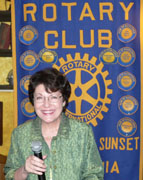Explanation of Ballot Initiatives I, by Jo-Anne Waller, League of Women Voters

Jo-Anne Waller grew up in Connecticut, obtained an undergraduate degree in Physics and a Masters degree in Math, and then became a high school science teacher. Her family moved to California in the 1970s and has lived in Palos Verdes since 1999. She has been busy recently speaking to many community meetings on behalf of the League of Women Voters to explain the 11 Propositions on the California November ballot. The League explains but does not take partisan sides on political issues. Tonight she covered Propositions 30 and 38, competing temporary tax measures to fund public education.
Prop 30, sponsored by the Governor and Legislature, would increase taxes on earnings over $250,000 for the next 7 years, and increase sales taxes by ¼% for the first 4 years, to fund public schools and State Colleges and Universities, increasing revenue by an average of $6 billion per year. (Since the passage of Prop 13 in 1978 limiting local property taxes, much of local school funding has come from the State government to compensate for their revenue loss, but this revenue transfer has been restricted in recent years due to State budget deficits.) If Proposition 30 does not pass, automatic additional spending cuts of $6 billion, much of it to education, will be triggered immediately in order to maintain State budget balance.
Prop 38 is a competing tax measure placed on the ballot by petition signatures. It would increase taxes on earnings for the next 12 years using a sliding scale ranging from 0.4% for joint filers’ taxable income over $14,632, to 2.2% for over $5 million, and would increase revenues by about $10 billion per year. For the next 4 years, this revenue would be allocated 60% for Schools, 10% for Early Care and Education, and 30% for State debt payments; for the remaining 8 years, this revenue would be allocated 85% for Schools and 15% for Early Care and Education. There would be no additional revenue for State Colleges and Universities. None of the additional revenue would be discretionary for the State General Fund.
If both of these Propositions pass, the one receiving the most votes would be implemented and the tax revenues of the other Proposition would not be implemented. Either Proposition would automatically terminate at its specified sunset date.
Jo-Anne answered numerous questions and stayed after the meeting for more questions (she did not take a stand on either of these issues). At our next week’s meeting, some of the remaining nine Propositions will be discussed by Arlene Block, also from the League of Women Voters.